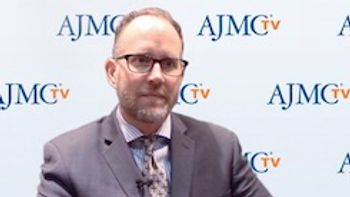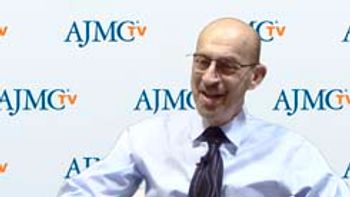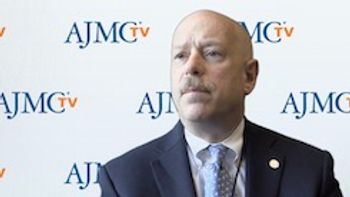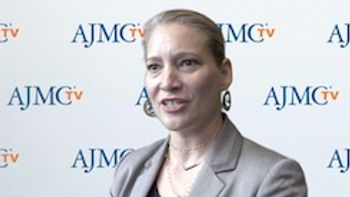
Before physicians will be more willing to take on 2-sided risk, there needs to be clearer metrics that the physicians know will be achievable, said Sarah Cevallos, chief revenue cycle officer at Florida Cancer Specialists.

Before physicians will be more willing to take on 2-sided risk, there needs to be clearer metrics that the physicians know will be achievable, said Sarah Cevallos, chief revenue cycle officer at Florida Cancer Specialists.

Implementing OCM has presented several challenges, such as manually submitting data, keeping up with status of therapy, and billing, said Jeff Patton, MD, CEO of Tennessee Oncology.

The implementation of the Oncology Care Model has brought profound culture changes to how oncologists take care of patients and how they operate practices, explained Lucio Gordan, MD, of Florida Cancer Specialists.

With the Oncology Care Model now in its second year, 3 representatives discussed learnings and how the program can change, as well as incentivizing physicians to accept 2-sided risk, the ability to engage additional payers, and the future of oncology bundle payments.

The digital transformation of the cardiology field in the coming years will have a huge impact on the delivery of healthcare, said John Rumsfeld, MD, PhD, chief innovation officer at the American College of Cardiology.

Participants from 2 oncology community practices—an oncologist–administrator combination—shared their experience with implementing the Oncology Care Model (OCM) with attendees at the Community Oncology Alliance’s Payer Exchange Summit on Oncology Payment Reform, held October 23-24, in Tysons Corner, Virginia.

Inviting patients to share their own health data can result in a better understanding of diseases and treatments beyond what can be learned from clinical data, according to a health data specialist who presented a session during the Academy of Managed Care Pharmacy 2017 Nexus meeting.

Outcomes-based risk sharing contracts will continue to become more common as health plans, providers, and drug manufacturers realize the benefits of these arrangements, according to speakers at a session of the Academy of Managed Care Pharmacy 2017 Nexus meeting.

At a session during the Academy of Managed Care Pharmacy 2017 Nexus meeting, a public policy expert argued that despite all of the news surrounding the Affordable Care Act (ACA), the US healthcare system may not see fundamental changes anytime soon.

The COMPASS trial results could reshape the standard of care for patients with coronary artery disease (CAD) and peripheral artery disease (PAD), according to Deepak Bhatt, MD, MPH, of Brigham and Women's Hospital and Harvard Medical School.

In light of recent guidance from the FDA on appropriate communications between payers and drug manufacturers prior to a drug's approval, a panel of stakeholders at the Academy of Managed Care Pharmacy 2017 Nexus meeting, discussed how these new guidelines can raise as many questions as they answer.

Experts from Express Scripts discussed how data on consumer behavior can be used to improve health outcomes and control the costs of care during a session of the Academy of Managed Care Pharmacy 2017 Nexus meeting.

A session at the Academy of Managed Care Pharmacy (AMCP) 2017 Nexus meeting discussed the implications of recent legislative and regulatory changes in healthcare at the federal and state levels.

Aimee Tharaldson, PharmD, of Express Scripts kicked off the Academy of Managed Care Pharmacy (AMCP) 2017 Nexus, held October 16-19 in Dallas, Texas, with a presentation on the pipeline of specialty pharmaceuticals in development.

The effects of air pollution on heart health are well known now, and it can be an issue for people in both urban and rural areas of the United States, explained Jeanette Stingone, PhD, of Mount Sinai Health System.

The American College of Cardiology (ACC) is entering into novel digital health partnerships to innovate cardiology care and improve cardiovascular health, explained John Rumsfeld, MD, PhD, chief innovation officer at the ACC.

Current drugs for pulmonary hypertension treat 3 pathways, but currently there aren't any new drugs to treat different pathways, although there likely will be some in the future, said Simon Gibbs, MD, Reader in Pulmonary Hypertension at the National Heart and Lung Institute, Imperial College London.

There is an ongoing debate about how aggressively to lower low-density lipoprotein (LDL) cholesterol, but Steve Nissen, MD, of Cleveland Clinic, argues that studies have shown an aggressive approach to lowering LDL always shows benefits.

John Eikelboom, MD, of McMaster University discusses the 3 arms of the COMPASS trial and explains the need for it to end earlier than anticipated.

During a presentation at the US Psychiatric and Mental Health Congress in New Orleans, Louisiana, Mark Zimmerman, MD, said studies show that the presence of a comorbid disorder or specific symptom were the most important factors driving treatment decisions when clinicians picked an antidepressant, and anxiety was the symptom they cited most frequently.

With so many options for treatment-resistant depression, expert George Papakostas, MD, said all things being equal, the patient's preference counts.

Leslie Citrome, MD, MPH, of New York Medical College, discusses payer coverage of atypical antipsychotics with fewer metabolic side effects.

A survey of patients with ADHD showed that two-thirds of those who augment their morning medication do so because it stops working, and 42% have to plan their day around their medication fading.

There is a stigma that comes with being addicted to opioids, even if they are prescribed to manage pain, that can hurt the care patients need to receive, said Arwen Podesta, MD, ABPN, FASAM, ABIHM, of Tulane University.

Payers have made tremendous progress in improving oversight of opioids and other pain medications, but what is really needed is a shift to abuse-deterrent formulations, which are more expensive, said Thomas Kosten, MD, a psychiatrist with Baylor College of Medicine.

The debate over marijuana policy tends to be dominated by people with political "skin in the game," when what's needed is a balanced, evidenced-based review, said Kevin P. Hill, MD, MHS, of Beth Israel Deaconess Medical Center and Harvard Medical School.

Experts said that the frequency and quality of social relationships have a greater effect on mortality than obesity or drinking alcohol, and this commands attention from health systems.

Right now, state policy regarding medical marijuana use is out ahead of the science, which can lead to predicaments where cannabis is prescribed in situations where it is not needed, explained Kevin P. Hill, MD, MHS, of Beth Israel Deaconess Medical Center and Harvard Medical School.

Patients with childhood trauma may have reduced response to antidepressant agents, and physician need to be given more free rein to tailor treatment approaches to treat those with major depressive disorder, said Vladimir Maletic, MD, MS, clinical professor of neuropsychiatry and behavioral science at the University of South Carolina School of Medicine.

Changes under the DSM-5 mean that certain "mixed features" create a gray area of characteristics that could signal major depression or bipolar disorder, even if a patient has not exhibited hypomania.

259 Prospect Plains Rd, Bldg H
Cranbury, NJ 08512
© 2025 MJH Life Sciences®
All rights reserved.
